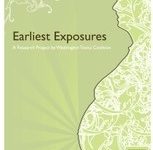SEATTLE— Babies enter the world already having been exposed in the womb to chemicals from common everyday consumer products, according to a new study released today by the Washington Toxics Coalition (WTC), Commonweal, and the Toxic-Free Legacy Coalition. The groups say policy changes are needed to protect babies and mothers from toxic chemicals during this critical time of development.
The first-of-its kind study tested blood and urine from pregnant women during their second trimester of pregnancy and found their bodies contaminated with chemicals found in a wide variety of consumer products.
“This study reveals that children spend their first nine months in an environment that exposes them to known toxic chemicals,” said Erika Schreder, staff scientist for the Washington Toxics Coalition, who authored the report. “Pregnant women can’t avoid every exposure to these chemicals because they are in so many products. They can’t shop their way out of this problem. We need policies that keep toxic chemicals away from pregnant women and the most vulnerable—the developing fetus.”
Chemicals detected include phthalates used in vinyl (PVC) plastic items like shower curtains, floors and toys; bisphenol A (BPA) found in polycarbonate water bottles and food and beverage cans; and “Teflon chemicals” used to make stain proofing treatments for clothing, carpeting and food packaging.
“I figured that I’m a pretty healthy person, so how bad could it be? When I finally got the results, three months after the birth of my daughter, I was surprised. The levels were much higher than I expected them to be,” Alex Rosenstein, study participant and realtor from Issaquah, Washington. “And this is just from living what I consider to be a normal life.”
The study tested pregnant women from Washington, California, and Oregon. Specific findings include:
- Every woman tested was exposed to bisphenol A, the hormone disrupting chemical used to make polycarbonate plastic and the lining for food cans. Bisphenol A is linked to cancer, early puberty, diabetes, obesity, and reproductive problems.
- Each woman had at least two and as many as four “Teflon chemicals,” or perfluorinated compounds, in her blood. These are chemicals used to create stain-protection products and non-stick cookware and are linked to low birth weight, obesity, and cancer.
- Mercury, known to harm brain development, was in the blood of every woman in the study.
- Every woman was exposed to at least four phthalates, the plasticizers and fragrance carriers found in consumer products from shower curtains to shampoo. Phthalates are linked to reproductive problems and asthma.
“With increasing rates of chronic diseases, like asthma, diabetes, and breast cancer, we need to update our country’s laws to ensure that harmful chemicals aren’t used in products mothers and children use everyday,” said Dr. Ted Schettler, MPH, science director, Science and Environmental Health Network. “As this study shows, even the most careful mother can’t protect herself from exposures to chemicals, so the answer is to phase them out of products.”
“Since 1976, only 200 chemicals out of the 80,000 on the market have been tested for health and safety. Clearly our current laws are failing us,” said Schreder. “We’re calling on policymakers at all levels of government to reform our outdated laws.”
In response to increasing consumer demand for safer products, Washington state officials have moved forward with some key reforms. In 2008, Washington state became the first state to place restrictions on lead and phthalates in children’s products. Right now, as part of this law, the Department of Ecology is developing a list of the most toxic chemicals for children and will be requiring toy manufacturers to report whether their products contain any of the chemicals. The Washington State Legislature will again consider whether to support a bill (HB 1180 and SB 5282) that would phase out the use of the hormone disrupting chemical bisphenol A (BPA) in baby bottles and sports water bottles.
Congress is also beginning to answer calls for reform. Senator Frank Lautenberg is expected to introduce new legislation next month to reform the outdated Toxic Substances Control Act (TSCA) – the current federal law for regulating chemicals.
Specifically, WTC, Commonweal, the Toxic-Free Legacy Coalition, and all members of the Safer Chemicals, Healthy Families Campaign are urging the following:
- The Washington State Legislature should pass the Safe Baby Bottle Act (HB 1187 and SB 5282), which will ban BPA in baby bottles, sports water bottles, and food and beverage containers.
- The Department of Ecology must fully implement the Children’s Safe Products Act of 2008 by developing a robust, scientifically-based list of chemicals that are harmful to children and workable rules that will require children’s product manufacturers to report whether their products contain harmful chemicals.
- Congress must reform TSCA to:
- Immediately initiate action to eliminate chemicals that build up in our bodies or are passed on to the next generation.
- Reduce the use of chemicals that can cause serious health problems such as cancer and reproductive harm, or lead to learning disabilities.
- Require manufacturers to create consumer products using only chemicals they have tested fully for safety and to provide full information on their hazards to the public.
- Preserve the rights of the states to enact legislation that sets higher chemical safety standards than federal law.
The Washington Toxics Coalition is a statewide non-profit organization that protects public health and the environment by eliminating toxic pollution. www.watoxics.org
Commonweal is a nonprofit health and environmental research institute in Bolinas, California that conducts programs that contribute to human and ecosystem health — to a safer world for people and for all life. www.commonweal.org
Safer Chemicals, Healthy Families is a nationwide effort to pass smart federal policies that protect us from dangerous toxic chemicals. www.saferchemicals.org
The Toxic-Free Legacy Coalition is a broad-based alliance of over 50 organizations across Washington state that works to ensure our children’s fundamental right to be born without toxics in their bodies and to grow up in a healthy environment. www.toxicfreelegacy.org

